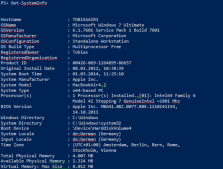支持所有版本
把结果变成复杂的HTML报告,一个简单的方法是定义三个脚本块:一个用作HTML的开头文档,一个用作它的结尾,还有一个是存放动态对象的表格
接着,把这些脚本块传入到ForEach-Object,分别对应脚本的开始块、中间要处理的动态列表块和结束代码块。
下面有个简单的例子阐述如何用它创造一个服务报告:
$path = "$env:temp\report.hta"
$beginning = {
@'
<html>
<head>
<title>Report</title>
<STYLE type="text/css">
h1 {font-family:SegoeUI, sans-serif; font-size:20}
th {font-family:SegoeUI, sans-serif; font-size:15}
td {font-family:Consolas, sans-serif; font-size:12}
</STYLE>
</head>
<image src="http://www.zzvips.com/yourlogo.gif" />
<h1>System Report</h1>
<table>
<tr><th>Status</th><th>Name</th></tr>
'@
}
$process = {
$status = $_.Status
$name = $_.DisplayName
if ($status -eq 'Running')
{
'<tr>'
'<td bgcolor="#00FF00">{0}</td>' -f $status
'<td bgcolor="#00FF00">{0}</td>' -f $name
'</tr>'
}
else
{
'<tr>'
'<td bgcolor="#FF0000">{0}</td>' -f $status
'<td bgcolor="#FF0000">{0}</td>' -f $name
'</tr>'
}
}
$end = {
@'
</table>
</html>
</body>
'@
}
Get-Service |
ForEach-Object -Begin $beginning -Process $process -End $end |
Out-File -FilePath $path -Encoding utf8
Invoke-Item -Path $path







